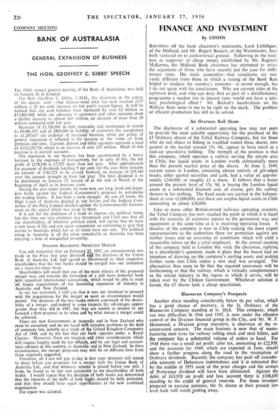FINANCE AND INVESTMENT
By CUSTOS ROUNDING Off the bank chairmen's statements, Lord Linlithgow, of the Midland, and Mr. Rupert Beckett, of the Westminster, have both ventured on to controversial ground. Following in the tradi- tion as supporter of cheap money established by Mr. Reginald McKenna, the Midland Bank chairman has attempted to refute the arguments of those who have recently put the case for stiffer money rates. His main contentibri—that conditions are now vastly different from those in which a raising of the Bank Rate helped to readjust the country's economy—is sound enough, but I do not agree with his conclusions. Why are current rates at the optimum level, and who can deny that as part of a disinflationary programme a modest rise in interest rates would not have a salu- tary psychological effect ? Mr. Beckett's lucubrations on the Welfare State seem to me to be right. on the mark. The problem of efficient production has still to be solved.
An Overseas Rail Share
The disclosure of a substantial operating loss may not seem to provide the most suitable opportunity for the purchase of the £5 Ordinary shares of the Taltal Railway Company, but for those who do not object to fishing in troubled waters these shares, now quoted in the market around 15s. 9d., appear to have merit as a lock-up speculative holding. The strength of the position is that this company, which operates a railway serving the nitrate area in Chile, has liquid assets in London worth substantially more than the present market price of the shares. At June 3, 1949, current assets in London, consisting almost entirely of gilt-edged stocks, other quoted securities and cash, had a value of approxi- mately £240,000, or roughly £1 a share. It follows that a buyer around the present level of 15s. 9d. is buying the London liquid assets at a substantial discount and, of course, gets the railway thrown in for nothing. The fixed assets are carried in the balance- sheet at over £1,000,000, and there are surplus liquid assets in Chile amounting to about £30,000.
Like so many other British-owned railways operating overseas, the Taltal Company has now reached the point at which it is faced with the necessity of extensive repairs to the permanent way and equipment at the same-time as it is incurring operating losses. A director of the comphny is now in Chile making the most urgent representations to the authorities there for protection against any further losses and an assurance of conditions which will yield a reasonable return on the capital employed. At the annual meeting of the company held in London this week the chairman, replying to a shareholder's-question, made it plain that the board had no intention of drawing. on the company's sterling assets and, putting further sums into Chile unless a new deal was arranged. The alternatives thus seem to be that the required assurances will be forthcoming or that the railway, which is virtually complementary to the nitrate industry in the region in which it serves, will be taken over by the Chilean Government. Whichever solution is found, the £5 shares look a cheap speculation.
Blaenavon Company's Prospects
Another share standing considerably below its par value, which has a good chance of recovery, is the 5s. Ordinary of the Blaenavon Company standing at ls. 10fd. This company, which ran into difficulties Ai 1946 and 1947, is now under the effective control of the Drayton financial group in the-City, and Mr. W. F. Hammond, a Drayton group executive, is chairman of the re- constructed concern. The main business is now that of manu- facturing steel tyres for railway rolling stock and steel billets, and the company has a substantial volume of orders in hand. For 1948 there was a small net profit. after tax, amounting to' £22,938, and the accounts for 1949, which are expected in June, should show a further progress along the road to the resumption of Ordinary dividends. Recently the company has paid off consider- able amounts of Debenture indebtedness and it is estimated that by the middle of 1951 most of the prior charges and the arrears of Preference dividend will have been eliminated. Against the debit of £63,920 on profit and loss account there is £108,650 standing to the credit of general reserves. For those investors prepared to exercise patience, the 5s. shares at their present low level look well worth „putting away.










































 Previous page
Previous page